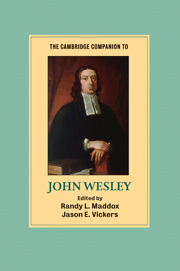Book contents
- Frontmatter
- Introduction
- Part I Wesley’s context
- Part II Wesley’s life
- Part III Wesley’s work
- 4 Wesley as revivalist/renewal leader
- 5 Wesley as preacher
- 6 Wesley as biblical interpreter
- 7 John Wesley as diarist and correspondent
- 8 John Wesley as editor and publisher
- 9 Wesley’s engagement with the natural sciences
- 10 Wesley as adviser on health and healing
- 11 Wesley’s theological emphases
- 12 Happiness, holiness, and the moral life in John Wesley
- 13 Wesley’s emphases on worship and the means of grace
- Part IV Wesley’s legacy
- Select bibliography
- Index
6 - Wesley as biblical interpreter
from Part III - Wesley’s work
Published online by Cambridge University Press: 28 September 2010
- Frontmatter
- Introduction
- Part I Wesley’s context
- Part II Wesley’s life
- Part III Wesley’s work
- 4 Wesley as revivalist/renewal leader
- 5 Wesley as preacher
- 6 Wesley as biblical interpreter
- 7 John Wesley as diarist and correspondent
- 8 John Wesley as editor and publisher
- 9 Wesley’s engagement with the natural sciences
- 10 Wesley as adviser on health and healing
- 11 Wesley’s theological emphases
- 12 Happiness, holiness, and the moral life in John Wesley
- 13 Wesley’s emphases on worship and the means of grace
- Part IV Wesley’s legacy
- Select bibliography
- Index
Summary
John Wesley famously called himself homo unius libri, “a man of one book.” He was, of course, an Oxford-educated man of many books, who assembled, edited, and then published a well-stocked Christian Library for ministers of the Methodist movement. What he meant by this self-appellation is that the Bible was always the one book close at hand, an indispensable auxiliary of the Spirit's formative work throughout his life and gospel ministry. Yet, Wesley never wrote a treatise or preached a sermon on the doctrine of Scripture. In part, this omission reflects a former day when the Bible's authority was widely assumed and the skepticism that emerged during the nineteenth century had not yet taken hold. The biblical criticism of early modern England was interested in the more modest tasks of discerning genuine from embellished texts, and orthodox from spurious interpretations, according to the standards established by the ancient Church and reaffirmed during the Protestant Reformation. Jane Shaw has made the case that England's initial reception of the Enlightenment at the beginning of its long eighteenth century was not centered in philosophers' academic discourse, but in discussions among ordinary believers who gathered together in the teahouses and alehouses throughout England to debate whether local testimonies of dramatic conversions or healing miracles were credible according to biblical teaching and the rules of reason.
- Type
- Chapter
- Information
- The Cambridge Companion to John Wesley , pp. 113 - 128Publisher: Cambridge University PressPrint publication year: 2009



